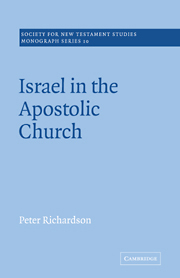Summary
INTRODUCTION
We turn from our brief consideration of Jesus to a longer treatment of Paul, without considering what is often called ‘primitive Christianity’. Our justification for this hiatus in tracing the development is fivefold: (a) the sources are meagre and secondary (primarily Acts); (b) while this primitive Christianity is unquestionably important, the sources are highly selective, making it impossible to assess its uniformity and variety; (c) Church consciousness must have progressed rapidly in this early period, under the impetus of Jesus’ post-Resurrection appearances and teaching, because of the intensity of the Spirit's filling, and because of the needs of this new group for material sharing and participation; but to detail the growth in community is largely outside our scope, and we need only assume the existence and organization of the Church; (d) it is not possible, because of the absence of theologically oriented sources, to observe the transformation taking place during the period called primitive Christianity; (e) Paul's theological position can be assessed independently of other early developments as a function of the teaching of Jesus and the mind and background of Paul himself, and moreover provides sufficient sources to watch developments and the circumstances that give rise to them.
Consequently, we shall presuppose that there are distinctive rites, practices, and teaching which identify the Church as a special group. Paul works within this Church, and adds to it through his activity as a herald and an interpreter of Jesus.
- Type
- Chapter
- Information
- Israel in the Apostolic Church , pp. 70 - 158Publisher: Cambridge University PressPrint publication year: 1969

